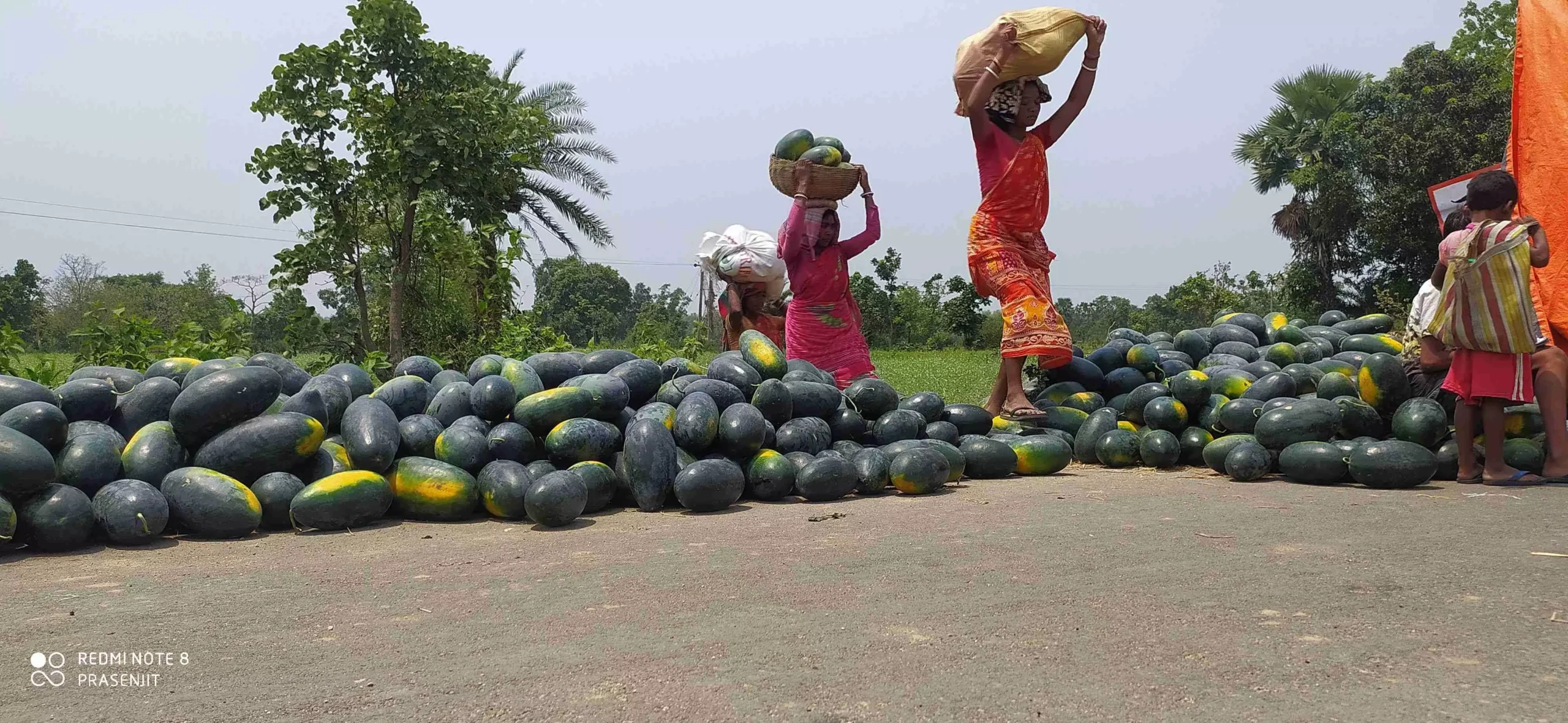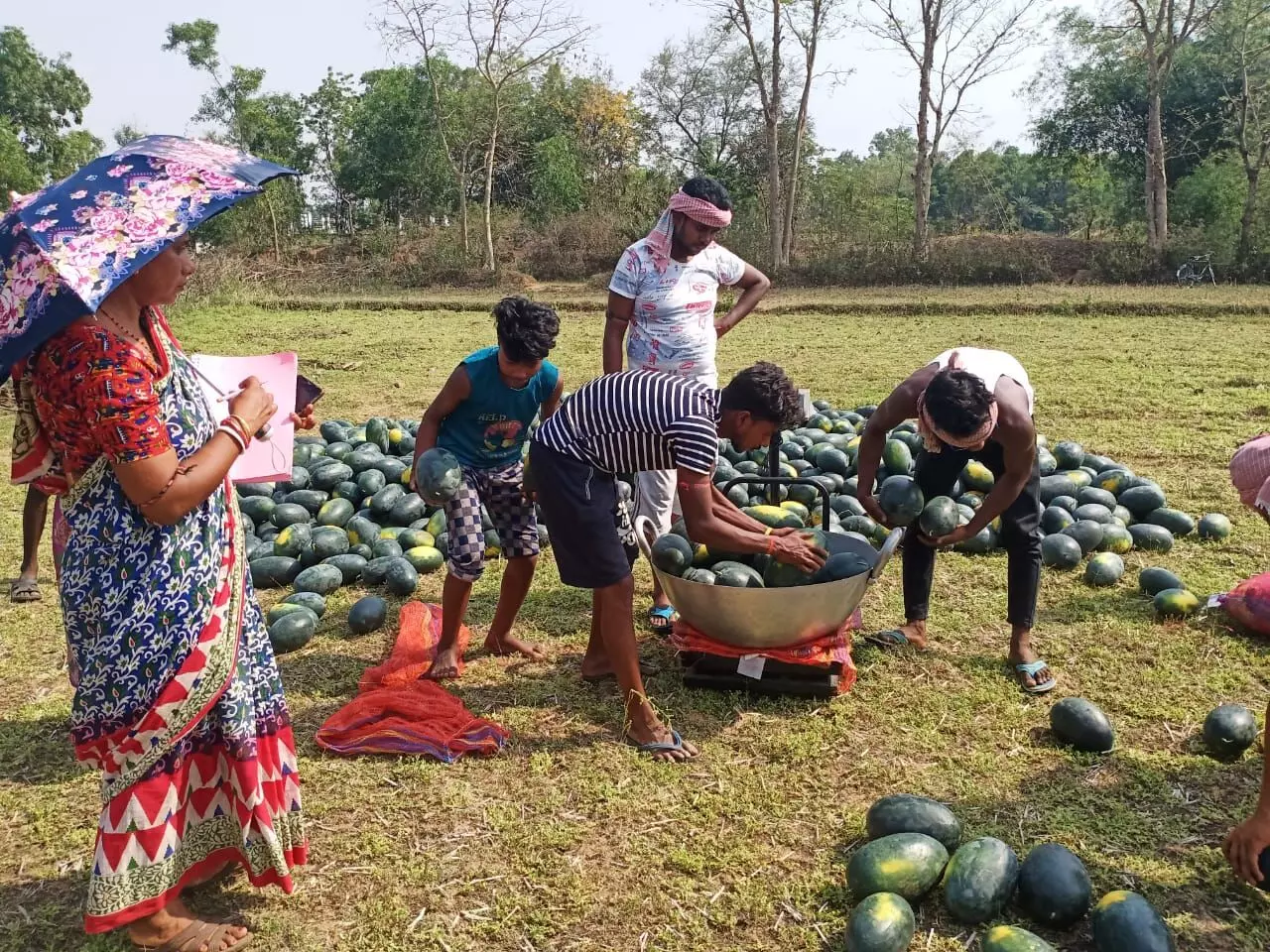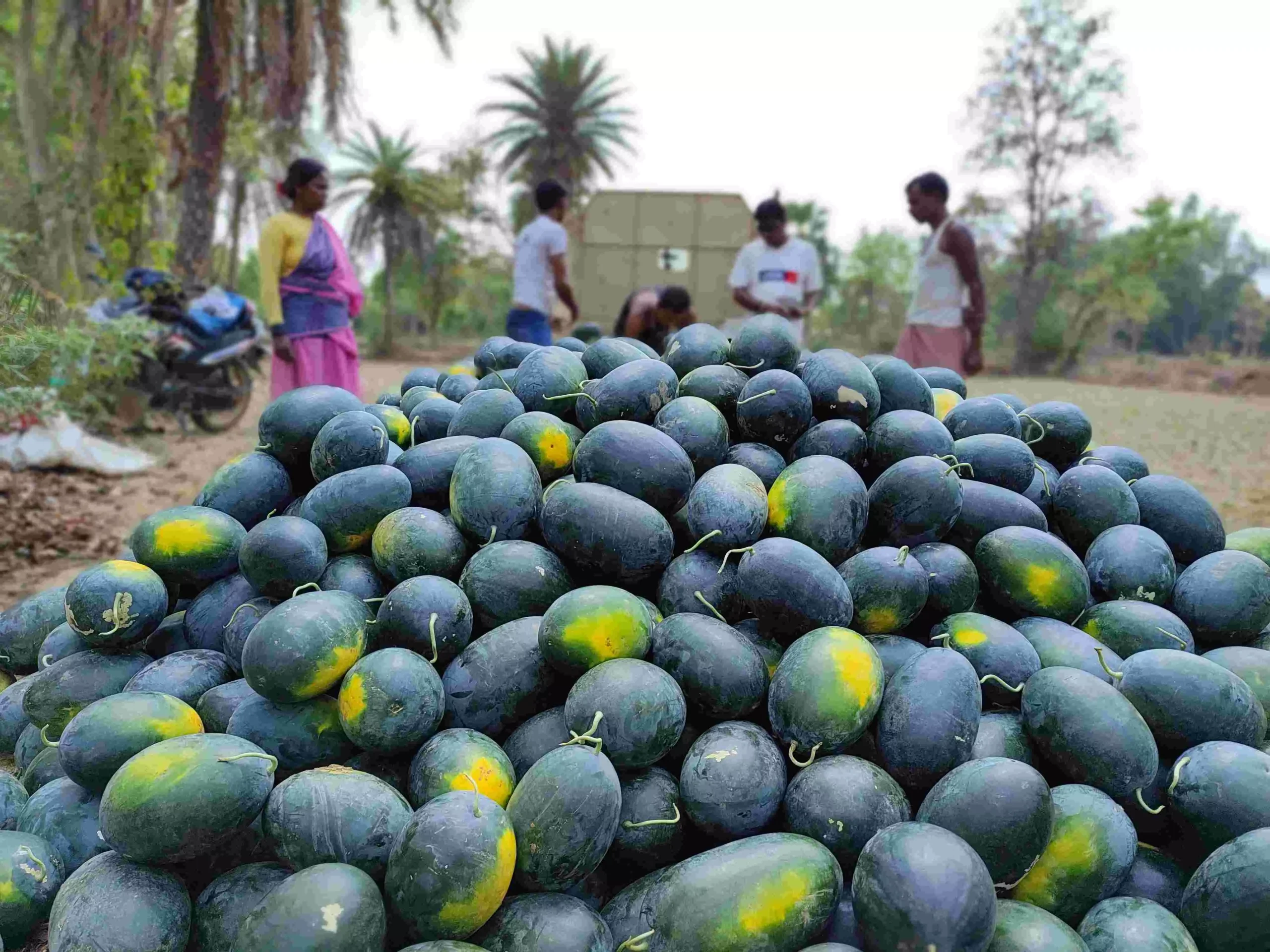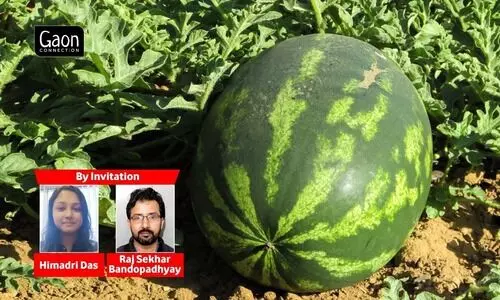Himadri Das & Rajsekhar Bandopadhyay
Bankura, West Bengal
Bankura district in West Bengal is mostly a mono-crop area with farmers relying on paddy during the kharif season. The area is characterised by undulating topography and comes under agro-climatic zone VII with an annual rainfall of 1,200-1,400 millimetre (mm). Due to the climate conditions and less investment in natural resources, farmers have only been cultivating the traditional crops.
However, for the past two years, some farmers in two blocks of the district – Hirbandh comprising five gram panchayats, and Indpur comprising seven gram panchayats – have taken up watermelon cultivation and are earning huge profits.
A women-based and women-led farmer producer company, Dalmadal Farmer Producer Company Limited, has also been set up which is helping with marketing of the produce and further strengthening the network of these watermelon farmers.

The market demand of this crop is 50-60 MT on a daily basis. Photo: By arrangement
Small and marginal farmers with low incomes
The farmers of Hirbandh and Indpur region are small and marginal farmers. The main basis of the village economy is agriculture, livestock, wage labourers and seasonal migration. Although the area is largely dependent on agriculture, the income level of farmers differs.
According to the National Statistical Office (NSO) report, the average annual income per agricultural household during the agricultural year 2018-19 is Rs 122,616, whereas the estimated average annual income per household of these two blocks in PRADAN’s Annual Household Income survey, was calculated around Rs 57,000 (FY 2020-21). Lack of knowledge, awareness, identifying quality seeds, fertilisers and pesticides schedules make it difficult for farmers to enhance production and fruit quality.
PRADAN’s local field-based team in Bangla has been working in the Hirbandh and Indpur blocks since 2010. Many new agriculture interventions like Direct Seeded Rice, System of Rice Intensification, cucumber and flat beans in trellis, brinjal, tomato under rain shelter and mustard were introduced by the unit.
Even though production was enhanced, farmers were struggling to ensure timely production as per market demand and get a good price for their crops. After the monsoon harvest, the lands remain barren until the next monsoon.

A women-led farmer producer company has also been set up which is helping with marketing of the produce. Photo: By arrangement
Introducing watermelon crop
Observing the climate and experience of farmers in the Bankura region, we learnt that watermelon could be a profitable crop during summers. Growing watermelon in one acre can lead to an average production of eight metric tonnes (MT) in one season generating an income of Rs 70,000-80,000 and the market demand of this crop is 50-60 MT on a daily basis.
Farmers usually procure their inputs individually and the fragmented lands of farmers compel them to do agriculture in a scattered manner. Hence, the need for collectivising farmers, especially women farmers, to do synchronised farming was felt.
PRADAN facilitated the collectivisation and women farmers joined Dalmadal Farmer Producer Company Limited with an objective to reduce market risk and assure an additional income. The FPC was registered on September 10, 2021 and the entire operations of the FPC is managed by women members.
Watermelon cultivation takes off
The PRADAN team started identifying farmers having perennial water sources for watermelon cultivation. Agriculture cadres were identified and were oriented on pest management and fertiliser schedules to support farmers cultivating the crop.
The team and FPC started organising village level meetings creating awareness on the benefits of watermelon. The FPC supported farmers in ensuring quality seeds, fertilisers, pesticides at door-step services. Farmers were provided training and exposure visits which helped them to gain confidence for growing the crop.
PRADAN initiated watermelon for the first time with farmers in the month of December 2020 and farmers started to show their enthusiasm towards the crop. We started to implement the activities with one hundred and two farmers and watermelons were grown from the month of January 2021.
The PRADAN team explored different options like government and line departments for developing linkages. Market linkage was developed with Sufal Bangla (an initiative of the Government of West Bengal for the benefit of the people to ensure fresh vegetables at reasonable price at their doorstep). We connected with vendors from Bankura, Durgapur, Asansol, Murshidabad, Jamshedpur and Delhi.
Through marketing channels, the farmers were able to make a profit of Rs 39 lakh producing 456 MT watermelons.

For the past two years, some farmers have taken up watermelon cultivation and are earning huge profits. Photo: By arrangement
Supported by learnings
Next year: The previous years’ experience supported us to apply from the learnings. This year was more systemic and intensive. Since the FPC got registered in the year 2021, the team started building capacities of FPC members to address the demands of farmer’s needs. The cadres were responsible to visit watermelon fields regularly, initiate weekly meetings with Producer Group and solve issues related to the crop.
Two hundred and six farmers started growing watermelons in an area of 471 acres. The year 2022 was filled with unfavourable rainfall which affected watermelon fields. Farmers endured innumerable losses reducing the size of farmers from 206 to 162 with an area covering 115 acres.
The watermelon started turning into green covering and red flesh fruit in the month of March 2022. From April 2 onwards, the team and FPC started marketing the products to local and distant markets.
The FPC marketed 222.37 MT of 140 farmers which made an impact on farmers by providing an increased income of Rs 24.23 lakhs. Through market linkages, the FPC made the first transaction from the farmers and vendors with a total commission of Rs 1.78 lakh. These efforts have helped build a trust among farmers as they received support for marketing, input procurements and significant income from FPC.

The FPC marketed 222.37 MT of 140 farmers which made an impact on farmers by providing an increased income of Rs 24.23 lakhs. Photo: By arrangement
Support required for the future
Watermelon can be a successful introduction in these two blocks; efforts are required to organise large numbers of farmers to realise the potential in earning profits. There are many government schemes which have been launched for farmers but there is a lack of information at the grassroots, FPC has a huge potential to bridge this gap.
There is a need for collaboration of stakeholders including government, Civil Society Organisations, Panchayati Raj Institution (PRI) bodies which will build on farmer collective action in agrarian livelihood context and create an impact in the lives of small, marginal and landless farmers.
The entire initiative was supported by the government departments of West Bengal like Panchayat & Rural Development, Water Resource Investigation and Development Department (WRIDD), Agriculture department, Agri-marketing department and our supporting donor agencies like Bharat Rural Livelihood Foundation (BRLF), Hindustan Unilever Foundation (HUF), Azim Premji Foundation (APF), Ratnakar Bank Limited (RBL), HDFC Bank. They have been continuously supporting PRADAN to bring a sustainable economic change in the lives of women farmers in the Jangalmahal area of rural West Bengal.
Das works in the Resource Mobilisation, Communication & Partnership unit at PRADAN. Bandopadhyay has 15 years of grassroot experience working at PRADAN, and has contributed in promoting and nurturing women-led collectives. Views are personal.




















